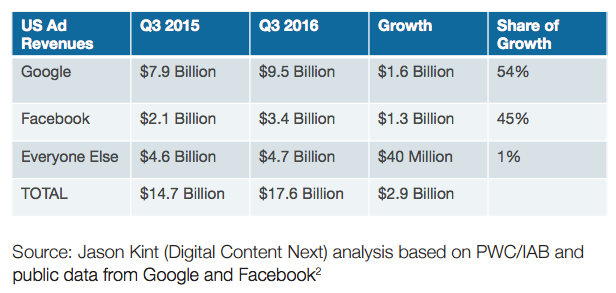
The report also highlights publishers’ conflicting views about the rise of social media platforms: Of the 143 editors, CEOs, and “digital leaders” surveyed across 24 countries:
— 70% said worries over the distribution of fake/inaccurate news in social networks will strengthen their position, while…
— 46% say they are more worried about the role of platforms than last year
— 56% say Facebook Messenger will be important or very important part of their offsite initiatives this year. 53% say the same for WhatsApp and 49% for Snapchat
— 33% of respondents from a newspaper background are more worried about their company’s financial sustainability than last year; just 8% are less worried
There are glimmers of hope in any number of as-yet-unproven-for-news technologies, including AR and VR and, perhaps most promisingly, automated voice assistants. Some bits from the report, written by Reuters Institute research associate Nic Newman:
— No wonder people are scared about digital ad revenue when Google and Facebook account for 99 percent of its growth in the U.S.

Print advertising revenue is also plummeting, but
— Fact-checking will be big (no surprise there), and it’ll get automated. The report predicts “hundreds of browser extensions and message bots offering fact checking services” by the end of the year. Paul Bradshaw of Birmingham City University: “Nothing stimulates technological development like war, and the information wars are already generating increasingly ‘augmented journalism’ as news organizations — and social media — develop the weapons to fight back.”“these forces are not just affecting traditional media…Mashable, a site that had just raised $15 million, laid off 30 people. Digital pioneer Salon announced a new round of budget cuts and layoffs. Even BuzzFeed was reported to have downgraded its 2016 earning targets by a considerable margin. Meanwhile the perils of relying on Facebook’s fickle algorithms (posts by publishers and brands were de-prioritized in June) were illustrated by the balance sheet of Elite Daily, the US based entertainment site owned by the Daily Mail. Its losses more than doubled as the company wrote down its value by $25M, making it effectively worthless.”
While much of the conversation around fake news has centered around the U.S. election, it isn’t a U.S.-only problem: “Expect to see more allegations that websites supported by Russian president Vladimir Putin are trying to undermine the democratic process — particularly in former communist countries. The Czech government is setting up an ‘anti-fake news’ unit to monitor around 40 websites pushing conspiracy theories and inaccurate information about migrants in the run up to October elections.”
— Publishers are more worried about distributed content, but they’re also more dependent on it.

“Instant Articles took up a lot of air time this year (rightly so) but it doesn’t seem to be delivering for publishers,” one respondent told Newman. “My concern is how hard Facebook now pull the ‘incentive’ lever.”
— Look to readers for the money as advertising dries up. “We expect display advertising to have pretty much vanished by 2025,” said Tom Standage, The Economist’s deputy editor. “Our core strategy going forward will be a resolute focus on membership, at a time when advertising revenue is an increasingly febrile business,” said Ed Roussel, The Wall Street Journal’s chief innovation officer.
Forty-seven percent of those surveyed said that direct reader payment is the digital revenue stream they’ll be focusing on most in 2017, followed by video advertising/sponsored video (45 percent) and sponsored content (42 percent)…and, uh, display advertising! (40 percent.)
“The big challenge will be converting our anonymous web users into known user segments, and the opportunity lies in what we’ll be able to do once this has been achieved in a robust and trustworthy manner,” one U.K. publisher said.
— More audio, less video? There will be a big focus on chat apps and chat bots, including voice news bots like Amazon’s Alexa and Google Assistant. That makes sense when
Amazon [said it] sold nine times the number of voice-activated products over Christmas as they sold in the whole of 2015 — many of them the super-affordable ($50) Echo Dot (below). Gartner predicts that 30% of web browsing will be done via these type of screen-less user interfaces (so called Zero-UI) by 2020.
(Tying back to the trend of automated fact-checking, “U.K.-based Full Fact is already looking into developing a service that can fact check live press conferences.”)
The report also sees renewed (continued?) excitement over audio — Facebook is launching live audio to users this year — but less over online video, even as it “remains a significant bet for most publishers.” There will be “disillusionment” over Facebook Live, “an inherently inefficient way of conveying information at a time when attention is increasingly at a premium,” and “some publishers complain that their short form video is no longer being prioritized in the news feed.”The full report is here.